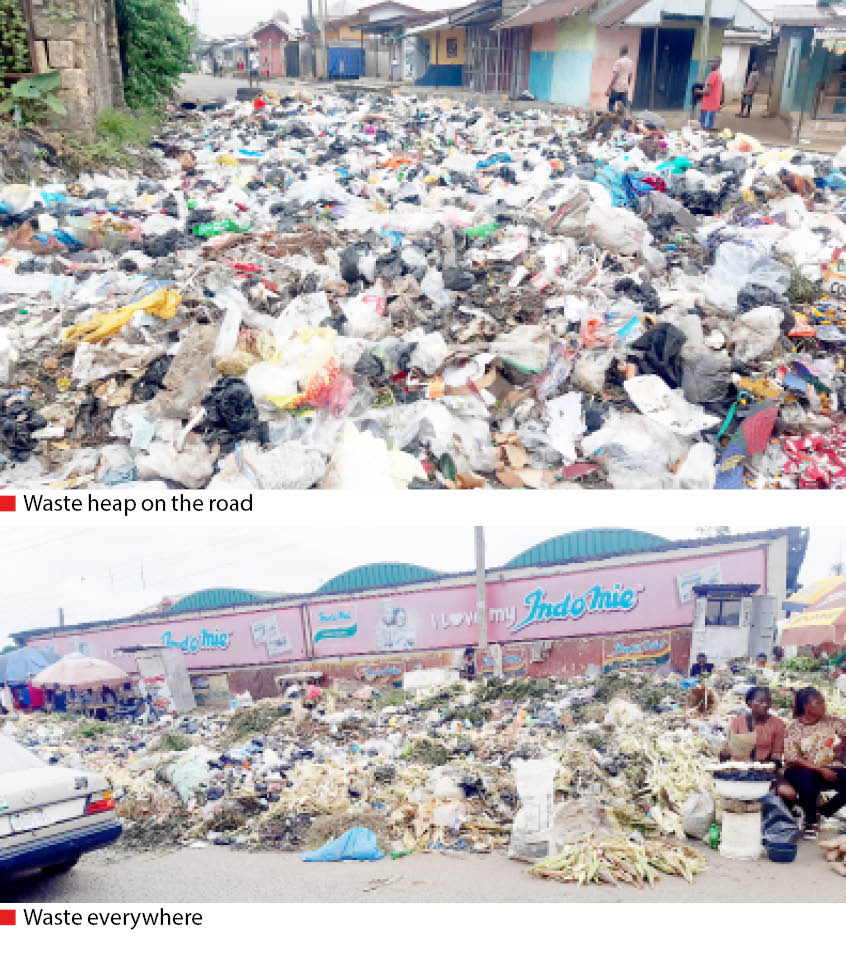Akwa Ibom State has, for five consecutive times, won the cleanest state award in the country and seems determined to maintain the status quo.
To encourage and commemorate this stride, the Niger Delta Development Commission (NDDC) donated five waste disposal trucks and receptacles, among other waste disposal equipment to the state while the state government acknowledged the efforts of the Akwa Ibom State Environmental Protection and Waste Management Agency (AKSEPWMA), led by Prince Akpan Ikim.
However, the growing volume of waste in Uyo, the state capital, is a big challenge to the state retaining this laurel it won from 2018 to 2022 for another year.
Waste explosion
- Troops arrest 12 suspected rail track vandals in Nasarawa
- I’m leaving military stronger, more capable – Irabor
Akwa Ibom is said to daily generate over 15,000 tonnes of municipal and household waste, and from observations, the waste heaps are concentrated in markets like Itam and Ikot Ambang markets, and waste disposal units around commercial areas where a lot of shops and small businesses are located like Abak road, Ikpa road close to University of Uyo, Atiku Abubakar Avenue, Ikot Ekpene road, Itu-Calabar road, IBB way, Nwaniba road, and Obio Imoh Street, among others.
The challenge has also been compounded by illegal street trading, as well as delay in evacuating wastes in residential areas after every sanitation day observed in the state. As the waste remains un-evacuated, it becomes hazardous as it obstructs traffic along major roads, where the refuse sites are located, and threatens a health and environment crisis for residents as the heaps grow. In fact, the mixture of rain water with the waste heaps produces a stench that pollutes the environment.
Acknowledging the increased volume of waste generated in Uyo, the chairman of AKSEPWMA, Ikim, said to handle the situation, waste was evacuated on a daily basis and anything short of that could mean that the waste trucks were bad.
“Akwa Ibom has expanded and the volume of waste has also increased and I can also tell you that the cost of hiring is also very high due to the cost of diesel. But we try as much as possible to be on top of our game.
“All resource persons are advised to evacuate waste promptly on a daily basis. Any place you see that waste is not evacuated, it is either they have problems with their truck or they are on the way to evacuate,” he said.
He mentioned that with regard to evacuation during sanitation days, waste disposal is carried out in four phases: pre-sanitation, sanitation, post-sanitation and mop-up exercise to readily rid the city of waste as it is dumped.
“If Saturday is environmental sanitation, you will start seeing people bring out their waste in preparation for sanitation. We are also on the street to identify places with a high volume of waste.
“Sanitation is not only between the hours of 7am and 10am. What we do is the pre-sanitation, where we identify places with high volumes of waste. Immediately it is a minute past 10am, we start the post environmental sanitation. After the environmental sanitation, the post and mop-up exercise begins and everywhere will be 98 per cent clean,” he stated.
However, some of the measures initiated by AKSEPWMA to reduce the growing waste heaps in the state capital have not worked out as anticipated. One is the failure of the pilot project of bagging and collecting waste from homes of residence starting from Ewet Housing Estate. Ikim attributed the failure to the uncooperative nature of residents to the scheme.
The chairman also lamented that the agency was being shortchanged by some local government councils as they have instituted their own bylaws and introduced sanitation fees in markets.
He claimed that the local governments that have introduced sanitation levies in markets have failed to keep the markets clean, and urged them to do so, saying he would no longer evacuate waste from such markets when the local government sanitation agents have already collected money from traders for waste evacuation.
“Some local governments woke up and said they had done a bylaw on the environment. Those persons have also devised a means for collecting sanitation fees in local markets. I will not evacuate waste for you in a market where you are collecting fees.
“If you are collecting a specified amount of money from market women for sanitation fees, you should use it to evacuate waste.
“So, local governments that have set up these laws and are collecting fees should please use those monies to evacuate waste. Like the issue of Akpanandem market, I have been doing some interventions around there, but I have told them point blank that I would not evacuate anymore.
“Until they stop collecting these levies from market women, then I would evacuate. But as much as they are collecting those levies from market women, they must use that money to evacuate those waste,” he insisted.
Findings from our correspondent from market women collaborated on the position of the AKSEPWMA. A groundnut seller in Itam market told our correspondent that sanitation fees were among the levies they pay.
“They collect sanitation fees from us, but as you can see, the market is dirty, no sanitation is done here. We just pay the money,” Madam Asian Edem said.
Solution to waste heaps
The World Health Organisation (WHO) has said over two billion tonnes of municipal solid waste are annually produced worldwide and improper disposal can lead to adverse health outcomes.
The WHO affirms that hazardous waste or unsafe waste treatment such as open burning can directly harm waste workers or other people involved in waste burning and neighbouring communities, while poor waste collection leads to environmental and marine pollution and can block water drains.
Unfortunately, these are the methods currently used to manage and treat waste in Akwa Ibom, which the WHO has declared as unsafe. However, to remedy the situation, the government is considering waste management innovations to waste that would benefit the state.
One such innovation is waste recycling. AKSEPWMA has said the state government is on the verge of keying into the practice of recycling waste through converting waste into energy and fertiliser. The agency explained that the process would translate into employment opportunities for citizens and revenue generation for the state.
“The world over has gone beyond the issue of generating, evacuating and dumping. The world over is talking about recycling. What we did was to advertise for companies to express their interest be it in terms of waste energy, waste fertiliser,” Ikim said.
For now, solid waste management and recycling is little known in Akwa Ibom as only a tiny fraction of residents take the venture as an income generating means for their daily survival. These ‘wastepreneurs’ are mostly seen at the Uyo Village Road dumpsite gathering plastic water or soft drink bottles for their recycling trade.
Speaking about the dumpsite along Uyo Village road, the AKSEPWMA chairman said, “That place would be like a transfer station and would create a lot of employment and also revenue for the state.”
He, however, charged citizens on the enforcement of environmental laws, saying it is the responsibility of the government, as well as the people.
“If all of us can enforce environmental laws, it would go a long way to help. It does not only affect the government, it affects us because we are the ones in the street,” he said.
The Foundation for Civic Education, Human Rights and Development Advancement (FOCEHRADA), has, however, criticised the waste management system of the government and described it as faulty.
The executive director of FOCEHRADA, Clifford Thomas, said the waste management system in place was just a tool of the government to win awards, adding that the practice is not sustainable.
“When you have population explosion, you have more generation of waste, and with this generation of waste, you have difficulty managing it. But the management of waste in Akwa Ibom has been very faulty. There is no proper management of waste.
“What we do is clean, pack refuse from some key points in Akwa Ibom State, film those key points, do a report to whoever gives that award and at the end of the day, we are described as the cleanest state in Nigeria. The ability to sustain that is doubtful.
“We may be the cleanest state in Nigeria, depending on their variables because I wouldn’t know the exact variables that were used, but whatever variables gave us the cleanest state in Nigeria requires that we do more,” he stated.
Thomas hinged his submission on the notion that the government was creating a health crisis for the state rather than evacuating waste, saying the Uyo Village Road dumpsite is a major water source to 24 local government areas in the state that was being contaminated with waste.
“You cannot pack waste in the city and dump the same in the water source of over 24 local government areas. Akwa Ibom is sitting on a keg of gunpowder. There are increasing cases of malaria and typhoid fever.
“The place where we dump waste in Akwa Ibom State is supposed to be a United Nations Educational, Scientific and Cultural Organisation (UNESCO) site. That place has a spring because it leads straight to the water level where the water table is. The spring springs up from there. We have a lake and a stream. It is a UNESCO heritage site but they have destroyed it.
“The waste, including human tissue, drives from that place into the Ikpa trough, which feeds several local governments with water. Beyond that, the litten that grows underground, that same water source you see at Uyo Village Road, is the same water source we have in more than 24 local government areas.
“So, when you dig a borehole and drink the water, you still have an increased incident of typhoid. The air and land are polluted, and the Akwa Ibom State Government is not cleaning the environment, it is rather polluting it,” he stated.




